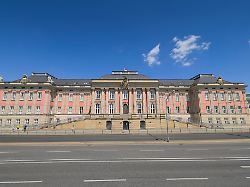Kenya coalition without a majority
Every third person in Brandenburg would vote for AfD
September 13, 2023, 8:36 p.m
Listen to article
This audio version was artificially generated. More info | Send feedback
In a year, a new state parliament will be voted on in Brandenburg. The currently governing Kenya coalition must fear for its majority. The big election winner would be the AfD. The CDU has to reckon with the most losses. The planned Wagenknecht party could have a significant influence on the vote.
In Brandenburg, the AfD is far ahead in favor of voters a year before the state elections. If a new state parliament were elected on Sunday, the right-wing populists would get 32 percent, according to the report Brandenburg trend according to RBB emerges. The SPD with Prime Minister Dietmar Woidke would get a fifth (20 percent) of the votes. The co-governing CDU and Greens would receive 18 and 8 percent. The left could count on 8 percent of the vote and the free voters on 6 percent. The FDP would again fail to enter the Potsdam state parliament. This is scheduled to be voted on on September 22, 2024.
Compared to the survey in April, the AfD was able to increase its popularity by nine points. The SPD, on the other hand, would lose two points and the CDU five points. All other parties represented in the state parliament can each increase by one point. The Kenya coalition made up of the SPD, CDU and Greens cannot currently rely on a majority. In addition, certain processes could be made more difficult: the state constitution stipulates that judges for the state constitutional court, for example, are elected with a two-thirds majority. This level of approval is also needed for constitutional changes. The AfD could block this if there were further increases in votes.
As the survey also showed, similar to April, a majority (57 percent) are dissatisfied with the work of the state government. At the same time, however, 51 percent, or more than half, of those surveyed said they were satisfied with the work of SPD Prime Minister Woidke. The 61-year-old is also the best-known and most popular state politician in Brandenburg. In stark contrast to this is the CDU state and parliamentary group leader Jan Redmann: only 28 percent of those surveyed know him, and eleven percent are satisfied with his work. However, he has only been party leader since the spring. However, he has been leading the group for four years. Only seven percent see the AfD parliamentary group leader Hans-Christoph Berndt, who according to RBB also wants to become the top candidate, positively.
With regard to the AfD, almost four out of ten respondents (38 percent) said they had no problem with the party participating in government. 37 percent of Free Voters supporters, a good quarter of CDU sympathizers and even one in five Left voters also see this.
Meanwhile, the new party with which the Left Bundestag member Sahra Wagenknecht has been flirting with for months is attracting comparatively great interest. 44 percent would like their founding. A majority of supporters of the Free Voters, the AfD and the Left actually welcome the new formation.
When asked about the most pressing problems, there was no consistent picture: 27 percent were primarily concerned about the heating law and energy policy. For 19 percent, immigration and flight are the most important issue, 14 percent named the war in Ukraine.
According to information, 1,160 eligible voters in the eastern German state were surveyed for the survey by infratest dimap from September 8th to 11th.
